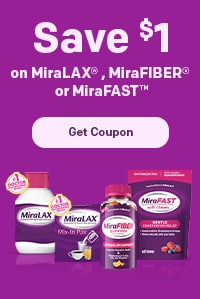When you’re feeling constipated, you just want to find relief fast. So how can you relieve your occasional constipation symptoms and get back to feeling like you?
The information provided on this site is for educational purposes only and is not a substitute for professional medical advice. Please consult a healthcare professional for medical advice, diagnosis and treatment
Laxatives for Relieving the Symptoms of
Occasional Constipation or Irregularity
Laxatives are over-the-counter (OTC) medications commonly used to relieve occasional constipation. Based on how they work, they’re grouped into several categories: osmotic agents, stimulants, fiber laxatives and stool softeners.
Keep in mind that not all laxatives are the same! While they share a common goal, they use very different methods to achieve it — and some can be harsher on your body than others.
Osmotic Agents
Agents such as polyethylene glycol 3350 (PEG), lactulose and magnesium hydroxide are water-loving substances that attract and retain water in the colon to help stools pass through more easily.
Polyethylene glycol, which is found in MiraLAX®, has the best clinical evidence to relieve constipation without harsh side effects. It works naturally with the water in your body to hydrate and soften, unblocking your system without causing harsh side effects. MiraLAX® is the #1 recommended choice for physicians, pharmacists and gastroenterologists.
Stimulant Laxatives
Like their name suggests, this type of laxative makes your body go by directly stimulating the nerves in your colon, helping to push stool along. While stimulant laxatives can be effective for relieving occasional constipation, they also may cause harsh side effects like cramping and sudden urgency.
Fiber Laxatives
This type of laxative traps water in the stool, helping you go by adding weight to your stool and improving its consistency. Fiber laxatives like psyllium and bran may work well for people who have occasional constipation and don’t get enough fiber in their diet.
Some powder fiber laxatives can be gritty when mixed into a beverage and may also lead to uncomfortable side effects like gas and bloating.
Stool Softeners
Stool softeners contain docusate sodium, an ingredient that softens stool to make it easier to pass.
Lifestyle Changes for Relieving Occasional Constipation
Other than taking a laxative, how can you relieve your constipation symptoms at home?
How Should I Change My Diet If I’m Constipated?
- Eat more soluble and insoluble fiber. Soluble fiber sources like oat bran, nuts, lentils, peas, dried fruits and some vegetables absorb water and can help soften stools and improve their consistency. Insoluble fiber sources like vegetables, wheat bran and whole grains can add bulk to stools, making them easier to pass.
- Drink more fluids. Dehydration is a common cause for constipation, so make sure you get enough fluid daily. Water is always a winner, and herbal teas, clear broth, beverages with electrolytes, coconut water and unsweetened juices are good options as well. The fruits and veggies you eat count toward your overall fluid intake, too!

What Lifestyle Changes Can Help with Constipation?
- Get a move on. Exercise may help the digestive system move food through the large intestine more efficiently. If you’re new to a regular exercise routine, start slow. A brisk walk around the block, a beginner-level hike or a casual bike ride can engage your muscles and get your digestive system moving. Talk to your doctor before starting an exercise routine.
- Stress less. The mind and the gut are intricately linked. Stress-related constipation can be caused by many factors, including changes to your diet and lifestyle, or a long period of inactivity. Try to reduce the stress in your life through mindful meditation, yoga or a daily exercise routine.
Occasional constipation doesn’t have to be the norm. Learn more about how to avoid constipation in the first place.

-
Jin J. Over-the-counter laxatives. JAMA. 2014;312:1167. doi:10.1001/jama.2014.2078. Accessed March 3, 2023. https://jamanetwork.com/journals/jama/fullarticle/1904830.
-
Pharmacy Times. 2022 Pharmacy Times survey of pharmacists’ OTC recommendations. Accessed March 3, 2023. https://cdn.sanity.io/files/0vv8moc6/pharmacytimes/86326ebdabcad93c75193a50a94fb30cf4e10661.pdf.
-
[ADD 2023 IQVIA CITATION]
-
DiPalma JA et al. A comparison of polyethylene glycol laxative and placebo for relief of constipation from constipating medications. South Med J. 2007;100:1085-1090. doi: 10.1097/SMJ.0b013e318157ec8f. Accessed March 3, 2023. https://pubmed.ncbi.nlm.nih.gov/17984738/.
-
Cleveland MV et al. New polyethylene glycol laxative for treatment of constipation in adults: a randomized, double-blind, placebo-controlled study. South Med J. 2001;94:478-481. Accessed March 3, 2023.https://pubmed.ncbi.nlm.nih.gov/11372795/.
-
DiPalma JA et al. A randomized, multicenter, placebo-controlled trial of polyethylene glycol laxative for chronic treatment of chronic constipation. Am J Gastroenterol. 1999;1:1-10. doi: 10.1111/j.1572-0241.2007.01199.x. Accessed March 3, 2023. https://pubmed.ncbi.nlm.nih.gov/17403074/.
-
Constipation. Mayo Clinic. Accessed March 3, 2023. https://www.mayoclinic.org/diseases-conditions/constipation/diagnosis-treatment/drc-20354259.
-
West H, Medical News Today. 13 home remedies for constipation. Updated January 24, 2023. Accessed March 3, 2023. https://www.medicalnewstoday.com/articles/318694.
-
Eske J, Medical News Today. Which drinks and juices are best for constipation? Updated January 30, 2023. Accessed March 16, 2023. https://www.medicalnewstoday.com/articles/324585.
-
Cleveland Clinic. Stool softener. Updated June 15, 2022. Accessed May 9, 2023. https://my.clevelandclinic.org/health/drugs/23274-stool-softener.





